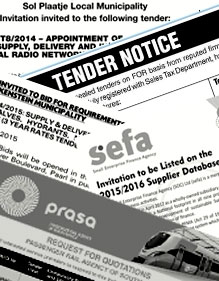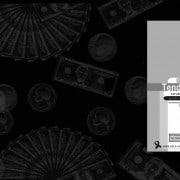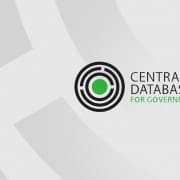|
Getting your Trinity Audio player ready...
|

By Lloyd Gedye
First published in Mail & Guardian
The national treasury is launching a central supplier database and a central e-tender portal next month in a bid to fight corruption and make government procurement more efficient and cost-effective.
In 2013/2014, the public sector spent R500-billion on goods, services and construction. Government itself has admitted that at least R30-billion of this was lost to corruption.
The overhaul of the government’s procurement processes and policies began with the establishment of the Office of the Chief Procurement Officer in the treasury in 2013. This will oversee the way in which the government does business with the private sector.
Finance Minister Nhlanhla Nene announced the move in his budget speech last week, a few weeks after the treasury released its 2015 supply chain management review, the first major assessment of government procurement since 2004.
Nene said: “Suppliers will be required to register once when they do business with the state.
“This will significantly reduce the administrative burden for business, especially small and medium-sized enterprises. This intervention will also reduce the administrative burden for supply chain management practitioners.”
Tax and BEE status
Nene said the database would interface with the South African Revenue Service, the Companies and Intellectual Property Commission and the payroll system, and would electronically verify a supplier’s tax and black employment equity status.
The system would also be able to identify a public sector official who was trying to do business with the state.
He said all tenders would be advertised on the e-tender portal, and all tender documents would be open to the public. “Tender advertisements in newspapers and the Government Gazette will be phased out.”
According to the review, public sector supply chain management is dogged by “constant allegations of corruption and inefficiency”.
It says some of the key problems are inexperienced leaders, high staff turnover rates, confusion about roles and responsibilities, political interference, red tape for small and medium businesses, and unethical behaviour.
Internal controls
There are 36 different government supply chain management systems, which are poorly integrated and automated. The review says internal controls are diluted if not applied consistently and this contributes to the noncompliance reported by the auditor general.
The treasury plans to replace all these systems with one, the integrated financial management system, and the central supplier database will fall under it.
This will make data mining possible. It will assist the government to identify trends, calculate costs accurately and improve the planning and costing procedures when compiling the budgets of departments, municipalities and parastatals.
The review says most tender processes lack transparency and, ideally, bid documents, committee evaluation minutes, bidders and their prices should be public. The government says it will enhance transparency by “institutionalising disclosure” and that all information will be housed on the procurement officer’s website.
The office is tasked with monitoring and regulating government procurement, managing centralised government contracts and making sure that the different spheres of government have the technology and policies needed to drive more cost-effective procurement.
The treasury also wants the office to have more power to intervene when there is a failure in the tendering process. This will include the cancelling of fraudulent contracts and the ability to claim damages. It will include blacklisting any company or individual found guilty of abusing a tender process.
Contract centralisation
The government is investigating the centralisation of government contracts for banking services, computers, information communication technology (ICT) services and infrastructure, consulting services, security services, air travel and accommodation, school textbooks and stationery, healthcare equipment and leased buildings.
The review says centralised contracting is an “important instrument”, which will enable the government at all levels to buy goods and services from a central list of approved suppliers who have been vetted for cost and quality.
The government has 37 central contracts covering 8 000 line items worth a total of R16-billion. It says the value of goods and services procured using central contracts will be increased significantly with the new line items.
The government spends R12-billion on consulting services, R10-million on ICT, R5-billion on air travel and accommodation, and R3.5-billion on security services. These four categories add up to more than R30-billion, almost double the value of total centralised contracts.
The list of nationally negotiated contracts will be expanded over the next three years, according to the review, which will save the government “significant sums”.









